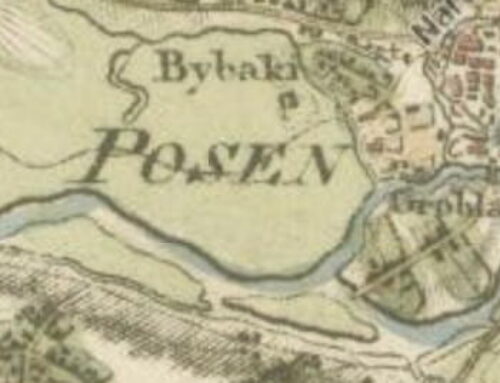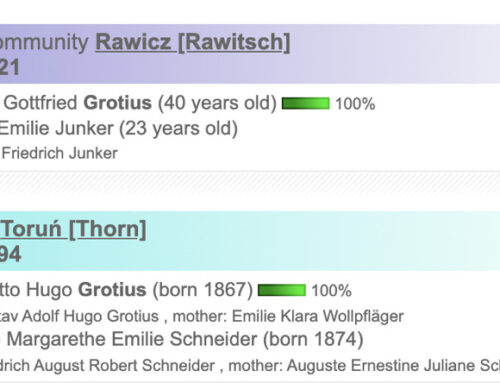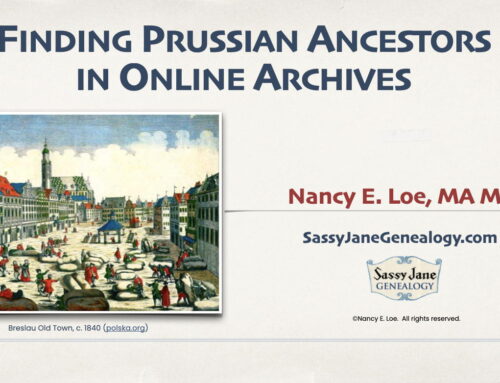Today’s post is about finding the birth and baptism of Anna Schumann,
my great-grandmother, from Freienwalde, Pomerania, Prussia.
The names, birth and baptism dates of her three siblings, the names of her parents, and more, were also found on the same roll of now digitized microfilm.
Searching for Anna Schumann
Not a lot to go on from a genealogical perspective, but this is what I knew when I started my search:
1. Her name was Anna.
2. Her mother’s name was Augusta.
3. Her family was (supposedly) from Berlin.
4. When she died, she was laid out in the front parlor of my grandmother’s Chicago apartment. My mother, age 9, is displaced by relatives in town for the funeral and had to sleep on the couch in the same room with the body. (File that under Hell No and also under Things We Don’t Ask of Our Children Today.)
5. Anna was divorced from her first husband and became very religious. She was separated from her second husband at the time of her death, possibly because she was fond of getting up at the crack of dawn to listen to Billy Sunday, the snake-oil fundamentalist evangelist, on the radio.

Passport for Anna Schumann Kirschstein
A Clue is Found
A couple of years ago, Ancestry put up the U.S. Passport Applications, 1795-1925 database. I never thought this would be a useful collection for me. My immigrant ancestors (all Burke’s steerage, never Burke’s peerage) arrived in the mid-1880s before passports were required.
Then I read the court records of Anna’s divorce from my great-grandfather Bruno Kirschstein. She vowed to leave him penniless and it looks like she succeeded. (I’m Team Bruno on this one.)
After that bit of information, I thought this database might be worth a look. Sure enough, in 1913 my great-grandmother Anna was doing so well she took a trip back to the old country and needed a passport. Needless to say, Bruno never went back home. He died in the poorhouse hospital in Cook County a few years after Anna went home in triumph.
Two Freienwaldes?
Anna listed her birthplace as Freienwalde in the application. Google told me there was a town outside Berlin called Bad Freienwalde in Brandenburg. Family stories said she was from Berlin, so I made the leap and put the spa town down for her birthplace.
About a year later, I had my mtDNA tested and the results came back very strongly for Pomerania. I did some reading and began to puzzle over Bad Freienwalde in Brandenburg. I couldn’t find any Schumanns that fit in that town.

Learn more about the changing place names, borders, and languages of Prussian genealogy research in my handy e-book.
And then with a bit more sleuthing at Kartenmeister, I discovered there was a town called Freienwalde in Pomerania, Prussia. Today it’s in Poland and called Chociwel, in the West Pomeranian Voivodeship. (Can I just say here that I remember geographical research before the Internet and it wasn’t pretty – lots of gazetteers and maps and frustration.)
The Family History Library catalog revealed exactly one roll of microfilm for Freienwalde, Pomerania, Prussia, and none for Bad Freienwalde in Brandenburg. Suddenly I knew which town I was rooting for!
I order the film just before the local stake library closes for the month of August. In the meantime, I did some further research on Anna’s siblings. One moved to Minnesota. Another ended up in Canada. And I find a tantalizing reference to Anna’s mother’s maiden name, but Linch doesn’t sound very Germanic.
Birth and Baptism of Anna Schumann
Using the birthdate from the passport application, I head straight for 15 July 1861 in the parish register. And there I find my great-grandmother just exactly where she should be. Parents: Friedrich Wilhelm SCHUMANN and Auguste Marie Luise LINDE.
Without my recent success finding Bruno Kirschstein’s birth and baptism, I’m not sure I would have been brave enough to try this. Swedish and Norwegian records don’t intimidate me as much as German ones for some strange reason.
Reading German Parish Registers
So I was feeling pretty smart. And then I realized that the pastor who kept the parish register spelled out the dates for births and baptisms. And my ability to pick out März and Mai and Juni and Juli suddenly didn’t mean much when I couldn’t figure out the numbers that went with those months. So I puzzled along with my German genealogical word list and relied mostly on the kindness of strangers. But at least I have a whole flock of Schumanns now and a lot of Lindes – but that’s a post for another day.





Steve, thanks for the tips about Katherine’s book and the FamilySearch groups. The Germany Genealogy group is very helpful and so is the Genealogy Translations group, both at Facebook.
https://www.facebook.com/groups/genealogytranslation/
https://www.facebook.com/groups/GermanGenealogy/
Luanne, if you know what town, the first place to search is FamilySearch. That will take you to the records that are available for that location.
https://www.familysearch.org/catalog/search
If you are unsure about exact location, you can always try searching the indexes for Germany at FamilySearch by name. Searching the individual birth, marriage, or death indexes usually gets better results.
https://www.familysearch.org/search/collection/location/1927074?region=Germany
My problem is I don’t understand how to find German parish records without traveling there. Is there a process I can use to search online? First try this, then if that doesn’t work try this, that sort of thing.
I have had to research a lot of German parish records and they can be a challenge. At RootsTech 2018 I attended Katherine Schober’s class on tips to reading German records. She had some very good tips and had just released a new book entitled “Tips and Tricks of Deciphering German Handwriting” which is available on Amazon. Another great site I learned about at RootsTech was a FamilySearch site that is new. There are many help groups that you can join and submit questions to experts. I joined the Germany group, but haven’t used it yet. (Most of my time recently has been renaming files and reorganizing according to archival principles :) These groups can be joined at community.familysearch.org. There is also a wiki page about these groups. It can be found at FamilySearch wiki page and looking for “Community Research Groups”
clairz, that’s very nice of you. I feel as though I’m mostly bumbling along on these German records.
Thank you for this blog, as it works as a good example of how these things should be done. I really like the way you explain how you found out the background on Anna.